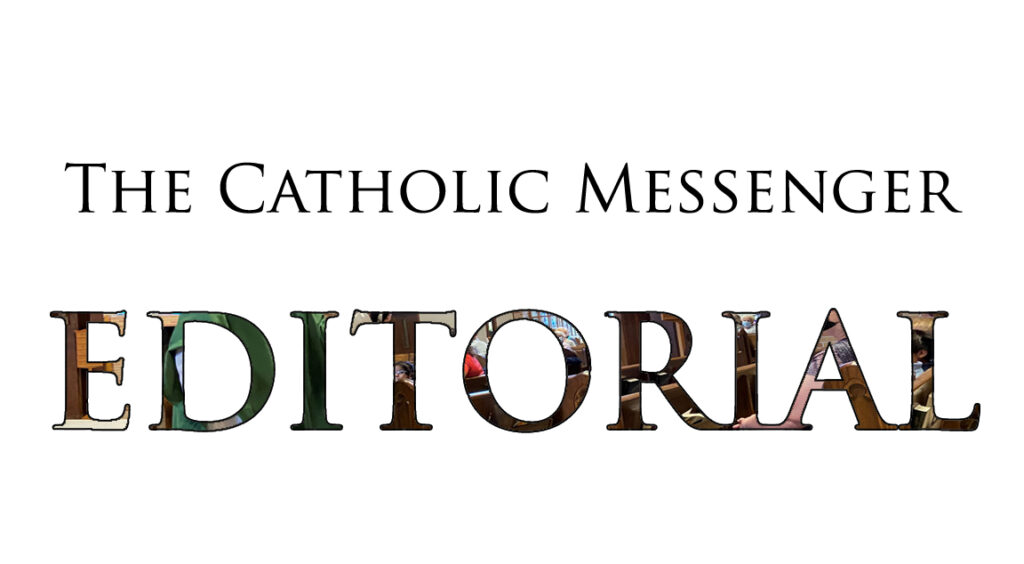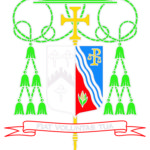
The early medieval Celtic peoples paid close attention to the rhythms of nature: the rising and setting of the sun, phases of the moon, storms, rainfalls, plants and animals. They “lived closer to famine through just a single, localized crop failure than we can imagine … It is from within that perspective we have to hear of the blessings of the fields, and crops and livestock. It is with such fears in mind we have to hear of people reciting the litanies as they walked around the fields and prayed for God’s protection and a good harvest,” theologian Thomas O’Loughlin says (“Journeys on the Edges, The Celtic Tradition”).
More than a thousand years later, the weather extremes we experience in Iowa and across the nation redirect our attention to God’s creation, which God entrusts to our care. The Eucharistic Revival underway in the United States provides another reminder of the connection between our faith and our fields. “The Eucharist joins heaven and earth; it embraces and penetrates all creation,” we read in “Laudato Si’” (“Praise Be to You, On Care for Our Common Home”). Pope Francis says, “[I]n the bread of the Eucharist, ‘creation is projected towards divinization, towards the holy wedding feast, towards unification with the Creator himself’. Thus, the Eucharist is also a source of light and motivation for our concerns for the environment, directing us to be stewards of all creation” (No. 236).
Our universal Church calls us to participate in the Laudato Si’ Action platform “to protect our common home for the wellbeing of all, as we equitably address the climate crisis, biodiversity loss, and ecological sustainability” (laudatosiactionplatform.org/laudato-si-goals/). Among the suggested actions are adoption of renewable energies and energy sufficiency measures, achieving carbon neutrality, protecting biodiversity, promoting sustainable agriculture and guaranteeing access to clean water for all.
No one is more attune to the rhythms (and disruptions) of nature than the farmers among us. We need to listen to them, to learn about their agricultural practices, challenges and successes and the ways in which we can collaborate with them in our collective roles as stewards of the earth. An upcoming event in the Diocese of Davenport provides an immediate opportunity.
“Seasons of Growth: A Time of Reflection, Discussion & Climate Action” on Sunday, Aug. 14, at St. James Parish in Washington is a collaborative effort of Iowa Interfaith Power & Light (IIPL) and the Davenport Diocese. Bishop Thomas Zinkula will open the event, which begins at 4 p.m. and concludes at 6:15 p.m. The bishop and area farmers will offer reflections, followed by panel discussion, a meal and discussion and action invitations. The event is free and open to the public. Register at (https://bit.ly/3OHlUEu).
“Folks in rural communities appreciate that we are part of the created world, not separate from it by virtue of their closeness to the land. Rural wisdom is so much a part of our diocese that such gatherings will be common as we account for the “cry of the poor and the cry of the Earth,” says Deacon Kent Ferris, director of Social Action and Catholic Charities for the Diocese of Davenport. “Care for creation is such an important and massive responsibility that coming together with folks from other faith traditions who share similar concern will also become standard practice.”
Other opportunities to learn about and act on our shared responsibility for stewardship of God’s creation include:
• The Laudato Si’ Action Platform website (laudatosiactionplatform.org/).
• “Laudato Si’” encyclical letter of Pope Francis (https://tinyurl.com/46h8zznf).
• The Catholic Climate Covenant website (catholicclimatecovenant.org).
• The U.S. Conference of Catholic Bishops’ webpage on the environment (https://tinyurl.com/2859vxhc).
• The Diocese of Davenport Social Action Home page (davenportdiocese.org/social-action).
• Sisters of St. Francis Laudato Si’ Action Platform commitment (clintonfranciscans.com/our-mission/laudato-si-action-platform).
• Iowa Business for Clean Energy website (iowacleanenergy.org) focused on reforming Iowa’s power grid and stimulating greater clean energy adoption and increased energy efficiency.
• Contact members of Congress (congress.gov) and ask them to support the Inflation Reduction Act of 2022, which includes investment in domestic energy production and manufacturing, and reduction of carbon emissions by roughly 40% by 2030.
“We must prioritize the needs of the poor and care for our common home. We must support climate investments that provide secure, affordable, accessible, and equitable energy without harming the economy or creating more hardship for the poor and vulnerable,” the U.S. bishops say. They believe that our investments today will determine the well-being of human life and all of creation for years to come.
The Celtic peoples and other cultures before and after them held the earth as sacred and placed their trust in God to guide them in their stewardship. May trust in God be our guide as well.
Barb Arland-Fye, Editor
arland-fye@davenportdiocese.org











